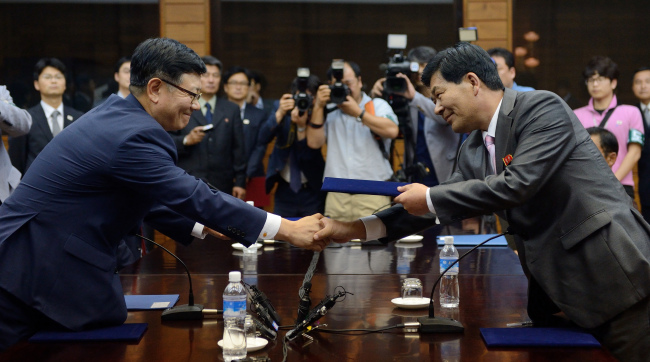Two Koreas agree to reopen Gaeseong industrial park
By Shin Hyon-heePublished : July 7, 2013 - 20:54
PANMUNJEOM ― The two Koreas tentatively agreed on Sunday to reopen their joint industrial park in Gaeseong “when ready” after more than three months of suspension.
They also decided to allow factory owners on Wednesday to check and repair their facilities and ship out goods, materials and equipment.
The two sides will meet again at the complex that day to discuss how to avoid unilateral suspension in the future, according to the four-point deal reached after 16 hours of marathon talks on the North side of the border truce village of Panmunjeom that started Saturday.
Seoul’s chief delegate said the talks will provide the “first step toward a future-oriented normalization” of the industrial zone and a “chance to build cross-border trust.”
“I thought the North side was highly enthusiastic and quite well understood the normalization issue and the situation facing our businesses. I also had an impression that the North side was very actively striving to resolve the Gaeseong issue,” said Suh Ho, head of the Unification Ministry’s inter-Korean cooperation district support directorate.
They also decided to allow factory owners on Wednesday to check and repair their facilities and ship out goods, materials and equipment.
The two sides will meet again at the complex that day to discuss how to avoid unilateral suspension in the future, according to the four-point deal reached after 16 hours of marathon talks on the North side of the border truce village of Panmunjeom that started Saturday.
Seoul’s chief delegate said the talks will provide the “first step toward a future-oriented normalization” of the industrial zone and a “chance to build cross-border trust.”
“I thought the North side was highly enthusiastic and quite well understood the normalization issue and the situation facing our businesses. I also had an impression that the North side was very actively striving to resolve the Gaeseong issue,” said Suh Ho, head of the Unification Ministry’s inter-Korean cooperation district support directorate.

He and Park Chol-su, vice director of the General Bureau of the Special Zone Development Guidance, convened two plenary sessions and 10 chief delegates’ meetings.
“We conducted today’s talks with the emphasis on tackling the firms’ difficulties such as the retrieval of completed goods and collection of raw and subsidiary materials, as three months have passed since the Gaeseong park’s halt and now the rainy season is drawing near,” Suh told reporters after the meeting.
The North promised to ensure the safety and smooth passage and communications for Seoul businessmen’s planned visit to Gaeseong Wednesday.
“In particular, it is meaningful given concerns over their safety due to the suspension of the complex,” he added.
Lying just north of the heavily fortified border, the complex had been a symbol of inter-Korean reconciliation since its inception in 2004, weathering political turbulence and armed conflicts.
In early April, Pyongyang abruptly barred South Koreans’ entry to the district and pulled out its 53,000 workers in apparent fury over U.N. sanctions and South Korea-U.S. military drills. Seoul soon followed suit, leading to an unprecedented full-scale shutdown and ensuing blame game.
The latest talks came three weeks after what would have been the first high-level government dialogue since 2007 fell apart over protocol matters.
President Park Geun-hye came into office in February with pledges to foster trust with the communist neighbor. But the so-called trustpolitik approach has so far borne little fruit, prompting criticism of her inflexibility and adherence to formality in the name of “global standards.”
Yet hopes are reviving again for a much-delayed thaw in cross-border relations worn out by reciprocal mistrust, hard-line policies and Pyongyang’s nuclear ambitions.
The agreement showed how the two rivals managed to find middle ground ― under mounting pressure of cash shortages on one side and, on the other, from the 123 firms whose debt is snowballing and machinery going rusty.
During the meeting, Seoul prioritized the speedy withdrawal of end products and raw and subsidiary materials, along with North Korea’s assurance to prevent a recurrence.
Pyongyang, for its part, called for a swift resumption of the complex and maintenance of facilities ahead of the imminent rainy spell, while expressing resistance toward “unnecessary” removal of raw and subsidiary materials.
The defining moment will likely come when the two Koreas gather on Wednesday to pore over ways to prevent another closure.
The South is seeking an apology ― what Suh called a “responsible expression of position” ― for the unilateral entry ban and subsequent loss for the companies, a claim the North is unlikely to concede to.
Another sticking point may be Seoul’s call for “institutional measures” to ensure easy passage, communications and customs as part of a “future-oriented normalization” of the park.
“Today’s agreement was made possible by the North accepting most of our demands, but Wednesday will be different because we did not sufficiently speak on the future-oriented normalization part,” a government official said on condition of anonymity due to the sensitivity of the matter.
By Shin Hyon-hee and Joint Press Corps
(heeshin@heraldcorp.com)











![[Hello India] Hyundai Motor vows to boost 'clean mobility' in India](http://res.heraldm.com/phpwas/restmb_idxmake.php?idx=644&simg=/content/image/2024/04/25/20240425050672_0.jpg&u=)







